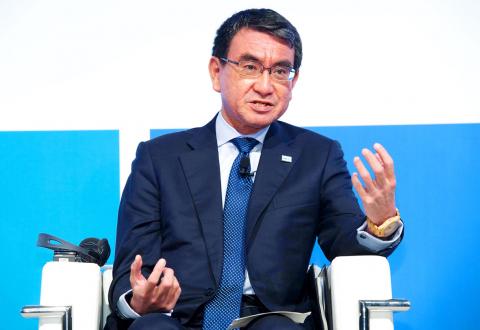The government yesterday said it would continue to seek Tokyo’s support and understanding after a top Japanese official said that Taiwan is unlikely to join the Comprehensive and Progressive Agreement for Trans-Pacific Partnership (CPTPP) because of the result of its referendum banning certain Japanese food imports.
“Japan’s reaction is understandable and this is going to be a strenuous challenge for Taiwan,” Executive Yuan spokeswoman Kolas Yotaka said, adding that the Cabinet has instructed government agencies to communicate with Tokyo.
The Ministry of Foreign Affairs in a press release said it would continue to engage in “earnest communication” with Japan and handle with discretion any possible actions Tokyo could take in response to the passage of a referendum on Nov. 24 that called for a continued ban on imports of Japanese agricultural and food products from Fukushima and four other prefectures after the 2011 Fukushima Dai-ichi nuclear power plant disaster.

Photo: EPA-EFE
A total of 7,791,856 people, or 78 percent of the votes cast, favored retaining the ban, further tying the hands of the Democratic Progressive Party (DPP) administration, which has sought to relax the major impediment to bilateral trade relations.
Speaking to reporters in Tokyo yesterday, Japanese Minister of Foreign Affairs Taro Kono reiterated Tokyo’s regret over the referendum’s passage, which he said has unfortunately made Taiwan’s bid to join the Japan-led CPTPP unlikely.
“If this [Taiwan’s import ban] violates WTO regulations, Japan does not rule out taking the matter to the WTO. In addition, the CPTPP pact is expected to take effect this year and it is very regrettable that this matter has made it unlikely for Taiwan to join the partnership,” Kono said.
It was the first time Kono has directly connected the import ban on Japanese food products with Taiwan’s chances of joining the CPTPP.
The ban has also resulted in the suspension of the Taiwan-Japan Economic Partnership Committee, which was established in 2013 as a platform for discussing economic, trade and investment issues.
After the conclusion of the annual Taiwan-Japan trade and economic meeting in Taipei on Nov. 30, Taiwan-Japan Relations Association Secretary-General Chang Shu-ling (張淑玲) conveyed Taiwan’s hope of being included in the CPTPP to her Japanese counterparts through different channels.
“We hope that Japan could offer us more assistance, including through the exchange of information,” she said.
Chinese Nationalist Party (KMT) Vice Chairman Hau Lung-bin (郝龍斌), who initiated the referendum, in a press release said that Japan’s use of the ban as a threat showed that the DPP’s claim that Taiwan-Japan relations are “at their best” is a lie.
“Taiwan and Japan have always had an uneven trade relationship. Taiwan holds a trade deficit of NT$600 billion [US$19.45 billion] with Japan. Haven’t we bought enough?” Hau asked, adding that the Taiwan-Japan relationship should not be built solely on meeting Japan’s demands.
According to Ministry of Finance statistics, Taiwan had a trade deficit of NT$634.8 billion with Japan last year.
Additional reporting by Lee Hsin-fan and CNA

Right-wing political scientist Laura Fernandez on Sunday won Costa Rica’s presidential election by a landslide, after promising to crack down on rising violence linked to the cocaine trade. Fernandez’s nearest rival, economist Alvaro Ramos, conceded defeat as results showed the ruling party far exceeding the threshold of 40 percent needed to avoid a runoff. With 94 percent of polling stations counted, the political heir of outgoing Costa Rican President Rodrigo Chaves had captured 48.3 percent of the vote compared with Ramos’ 33.4 percent, the Supreme Electoral Tribunal said. As soon as the first results were announced, members of Fernandez’s Sovereign People’s Party

EMERGING FIELDS: The Chinese president said that the two countries would explore cooperation in green technology, the digital economy and artificial intelligence Chinese President Xi Jinping (習近平) yesterday called for an “equal and orderly multipolar world” in the face of “unilateral bullying,” in an apparent jab at the US. Xi was speaking during talks in Beijing with Uruguayan President Yamandu Orsi, the first South American leader to visit China since US special forces captured then-Venezuelan president Nicolas Maduro last month — an operation that Beijing condemned as a violation of sovereignty. Orsi follows a slew of leaders to have visited China seeking to boost ties with the world’s second-largest economy to hedge against US President Donald Trump’s increasingly unpredictable administration. “The international situation is fraught

MORE RESPONSIBILITY: Draftees would be expected to fight alongside professional soldiers, likely requiring the transformation of some training brigades into combat units The armed forces are to start incorporating new conscripts into combined arms brigades this year to enhance combat readiness, the Executive Yuan’s latest policy report said. The new policy would affect Taiwanese men entering the military for their compulsory service, which was extended to one year under reforms by then-president Tsai Ing-wen (蔡英文) in 2022. The conscripts would be trained to operate machine guns, uncrewed aerial vehicles, anti-tank guided missile launchers and Stinger air defense systems, the report said, adding that the basic training would be lengthened to eight weeks. After basic training, conscripts would be sorted into infantry battalions that would take

GROWING AMBITIONS: The scale and tempo of the operations show that the Strait has become the core theater for China to expand its security interests, the report said Chinese military aircraft incursions around Taiwan have surged nearly 15-fold over the past five years, according to a report released yesterday by the Democratic Progressive Party’s (DPP) Department of China Affairs. Sorties in the Taiwan Strait were previously irregular, totaling 380 in 2020, but have since evolved into routine operations, the report showed. “This demonstrates that the Taiwan Strait has become both the starting point and testing ground for Beijing’s expansionist ambitions,” it said. Driven by military expansionism, China is systematically pursuing actions aimed at altering the regional “status quo,” the department said, adding that Taiwan represents the most critical link in China’s